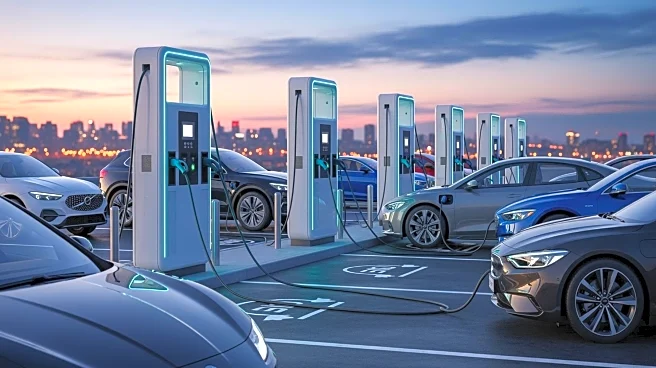What's Happening?
The U.S. electric vehicle (EV) market has reached a milestone with 70 models now available, reflecting significant growth and diversification. This expansion includes a range of models from various manufacturers,
offering consumers a wide array of choices. Prices for these models vary, with some starting below $40,000, making EVs more accessible to a broader audience. The list includes popular models like the Tesla Model 3 and Chevy Bolt, as well as luxury options such as the Audi e-tron GT and Mercedes EQS. The increase in available models highlights the industry's shift towards electrification and sustainable transportation.
Why It's Important?
The growth of the EV market is pivotal for the automotive industry and environmental sustainability. With more models available, consumers have greater flexibility in choosing vehicles that meet their needs and preferences. This expansion supports the transition to cleaner transportation, reducing reliance on fossil fuels and lowering emissions. The availability of affordable EVs can drive increased adoption, contributing to the U.S. goal of reducing carbon emissions and combating climate change. Automakers stand to benefit from tapping into the growing demand for electric vehicles, while consumers gain access to innovative and efficient transportation options.
What's Next?
As the EV market continues to expand, automakers may focus on enhancing technology and performance to differentiate their offerings. The industry is likely to see increased investment in charging infrastructure and battery technology, addressing consumer concerns about range and convenience. Policymakers may implement incentives to further encourage EV adoption, supporting the transition to sustainable transportation. The competitive landscape will drive innovation, with manufacturers striving to capture market share and meet evolving consumer expectations.
Beyond the Headlines
The expansion of the EV market reflects broader trends in consumer behavior and environmental awareness. It underscores the importance of sustainable practices and the role of technology in shaping the future of transportation. The shift towards electrification presents opportunities for economic growth and job creation in sectors related to EV production and infrastructure development. As the market evolves, stakeholders must navigate challenges such as supply chain constraints and regulatory changes, ensuring a smooth transition to a greener automotive industry.








